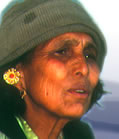THEMES IN THIS
TESTIMONY
Health

Spiritual Beliefs

Click on arrows
to find more
testimonies
featuring
these themes
|
|
Sex
|
male
|
|
|
Age
|
37
|
|
|
Identity
|
N
|
|
|
Occupation
|
herbal medicine practitioner
|
|
|
Location
|
Thakani VDC, Sindhupalchok
|
|
|
Date
|
December 1993
|
|
summary
This interview focuses entirely on traditional medicine (jardibuti). The narrator has been practising traditional medicine for 10-12 years, as did five or six generations in his family before him. Herbal remedies are passed from generation to generation – he learned from his grandfather – but “it is our secret. We have to search for [the ingredients] secretly”, in gardens and on the hillside. Herbs, leaves, grass, bark, buffalo dung, ash, etc, are used, either on their own or mixed. Outsiders may say a remedy is dangerous, but “we are the expert”.
He comments on people’s attitudes to traditional medicine – older villages in particular prefer to be treated by jardibuti because the hospital is far away and medicine there is expensive. But serious cases are sent to the hospital. The narrator treats people for free – “it is social work” – because the plants and herbs grow freely. But it does take up valuable time and he’s considering accepting money or a favour in return: “I don’t get much, but if I take money, they will realise its [the remedy’s] importance”. There is an interesting section on villagers’ superstitions, about witches and evil spirits making them ill. Although he doesn’t share their beliefs he treats them, believing that their faith in the treatment, cures them.
Towards the end of the interview he expresses regret at his limited education; he would have studied longer, as his male cousins did, if his father had been alive. He has some literacy, though, which helps him in his work.
detailed breakdown
|
You will need a password from Panos to view the full
transcript of the interview. To apply for a password, click here.
Once you have a password, click here to go to the beginning
of the transcript. You can also click on any section of the
breakdown of content below and go straight to the
corresponding part of the transcript.
|
| Section 1-2 |
He is a farmer, “But after ActionAid has come here, I give vaccines to the animals, and also sell seeds of vegetables.”
He also treats people using jardbuti – traditional medicine. The hospital is far but people go there in serious cases.
Gives general description of various remedies to treat pneumonia, cuts, fractures, worms etc
|
| Section 3-4 |
More detail on treating broken bones.
“Some people think these jardibutis are the same as hospital medicines. They think it is better to make here than to go far and bring from the hospital.” He stores plants for urgent cases when he won't have time to collect them. Using jardibutis is a specialist skill not known by everyone, they rely on him in the village.
Villagers believe in evil spirit that comes disguised as the wind or appears as bad omens in dreams, bringing illness. He doesn't share the superstition, but does believe you need to have faith to be cured. “If you don't have faith, even using hospital medicine will not make you good.”
|
| Section 4 |
Describes plants and holy water given to ease childbirth. But if in real difficulty, the woman is taken on stretcher to hospital. In response to demands from women who are "fed up of making children”, his grandmother taught him herbal abortion-inducing remedy.
His skills have been handed down through generations; his father and grandparents also used jardibuti.
|
| Section 5 |
Talks about Dipo - family planning medicine from the hospital: “In our village the women have to do hard work from morning to night... For those who get sufficient diet and can take a rest at home...taking Dipo is alright. But for those women who cannot get enough food and rest, for them it is harmful.”
Till now has treated people for free, but is thinking of charging.
Nurtures the supply of medicinal plants in the area. When he sees a new plant, he will "carefully sow it in my field. I will love and preserve it". Describes one useful plant – ajambari - used to treat pneumonia, urinary and heart problems.
|
| Section 6 |
Had an unhappy childhood: father died before he was born, so he had to leave school to go to work. Describes villagers’ mutual help system. He looks after their health and treats their animals, and they in turn work his fields. "I protect them, they will protect me. So everywhere happiness for me.”
He treats patients in his way, while other healers have their own remedies. If he can't cure someone, he sends them to another healer and, as a last resort, to hospital.
|
|


